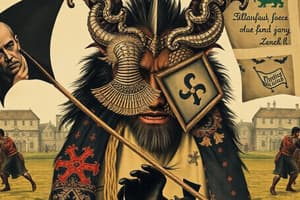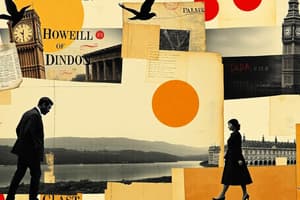Podcast
Questions and Answers
Which of the following works is categorized under Old English literature?
Which of the following works is categorized under Old English literature?
- The Canterbury Tales
- Paradise Lost
- Beowulf (correct)
- The Waiter's Farewell
What is a defining characteristic of the Renaissance period in English literature?
What is a defining characteristic of the Renaissance period in English literature?
- Exploration of individualism and humanism (correct)
- Focus on satire and comedy
- Themes of social reform and realism
- Emphasis on emotion and nature
Which literary device represents the use of symbols to convey deeper meanings?
Which literary device represents the use of symbols to convey deeper meanings?
- Alliteration
- Personification
- Metaphor
- Symbolism (correct)
Which period is known for its examination of social structures and moral questions?
Which period is known for its examination of social structures and moral questions?
What feature distinguishes Modernism in English literature?
What feature distinguishes Modernism in English literature?
Which notable author is associated with the Romantic period?
Which notable author is associated with the Romantic period?
What is a common theme explored across various periods in English literature?
What is a common theme explored across various periods in English literature?
Which characteristic is typical of Postmodernism in literature?
Which characteristic is typical of Postmodernism in literature?
Flashcards are hidden until you start studying
Study Notes
Overview of English Literature
- English literature refers to the body of written works produced in the English language.
- It encompasses a range of genres, including poetry, prose, drama, and essays.
- Major historical periods: Old English, Middle English, Renaissance, Restoration, Romanticism, Victorian, Modernism, Postmodernism.
Key Periods and Movements
-
Old English (ca. 450-1150)
- Notable works: "Beowulf"
- Characteristics: Germanic and Anglo-Saxon influence, oral tradition.
-
Middle English (ca. 1150-1500)
- Notable works: Geoffrey Chaucer's "The Canterbury Tales"
- Characteristics: Rise of courtly love, religious themes.
-
Renaissance (16th-17th centuries)
- Notable authors: William Shakespeare, John Milton, Christopher Marlowe.
- Characteristics: Humanism, exploration of individualism, classical influences.
-
Restoration (1660-1700)
- Notable authors: John Dryden, Aphra Behn.
- Characteristics: Satire, comedy of manners, restoration of the monarchy.
-
Romanticism (late 18th-early 19th centuries)
- Notable authors: William Wordsworth, Samuel Taylor Coleridge, Lord Byron, John Keats.
- Characteristics: Emphasis on emotion, nature, individualism, and the sublime.
-
Victorian (1837-1901)
- Notable authors: Charles Dickens, George Eliot, Thomas Hardy.
- Characteristics: Social reform themes, realism, and moral questions.
-
Modernism (20th century)
- Notable authors: Virginia Woolf, James Joyce, T.S. Eliot.
- Characteristics: Stream of consciousness, fragmentation, existential themes.
-
Postmodernism (mid-20th century onward)
- Notable authors: Thomas Pynchon, Don DeLillo, Salman Rushdie.
- Characteristics: Irony, playfulness, questioning of narrative structure and authority.
Key Themes in English Literature
- Identity and Self: Exploration of personal and cultural identity.
- Society and Class: Examination of social structures and class disparities.
- Love and Relationships: Diverse representations of romantic and familial love.
- Nature: Reflection on the human relationship with the natural world.
- Conflict and War: The impact of war on humanity and society.
Important Literary Devices
- Metaphor: Comparison between two unlike things for deeper meaning.
- Alliteration: Repetition of consonant sounds at the beginning of words.
- Symbolism: Use of symbols to represent ideas or concepts.
- Irony: Expression of meaning through language that signifies the opposite.
- Allegory: A narrative that serves as an extended metaphor.
Notable Works and Their Authors
- "Pride and Prejudice" - Jane Austen
- "1984" - George Orwell
- "Jane Eyre" - Charlotte Brontë
- "The Great Gatsby" - F. Scott Fitzgerald
- "The Waste Land" - T.S. Eliot
Studying Tips
- Read diverse genres to understand different styles and themes.
- Analyze character development and narrative structure.
- Explore historical and cultural contexts of literary works.
- Discuss themes and motifs with peers for deeper understanding.
Overview of English Literature
- English literature encompasses works produced in the English language, spanning various genres like poetry, prose, drama, and essays.
- Key historical periods include Old English, Middle English, Renaissance, Restoration, Romanticism, Victorian, Modernism, and Postmodernism.
Key Periods and Movements
-
Old English (ca. 450-1150)
- Featured notable works like "Beowulf".
- Influenced by Germanic and Anglo-Saxon cultures, with a strong oral tradition.
-
Middle English (ca. 1150-1500)
- Known for works such as Geoffrey Chaucer's "The Canterbury Tales".
- Themes of courtly love and religious narratives were prevalent.
-
Renaissance (16th-17th centuries)
- Prominent authors include William Shakespeare, John Milton, and Christopher Marlowe.
- Marked by humanism, individual expression, and classical inspirations.
-
Restoration (1660-1700)
- Important figures include John Dryden and Aphra Behn.
- Notable for satire, comedy of manners, and the return of the monarchy.
-
Romanticism (late 18th-early 19th centuries)
- Featured key authors like William Wordsworth, Samuel Taylor Coleridge, Lord Byron, and John Keats.
- Focused on emotion, nature, personal freedom, and the exploration of the sublime.
-
Victorian (1837-1901)
- Noteworthy authors include Charles Dickens, George Eliot, and Thomas Hardy.
- Addressed themes of social reform, realism, and moral dilemmas.
-
Modernism (20th century)
- Key writers include Virginia Woolf, James Joyce, and T.S. Eliot.
- Characterized by stream of consciousness, narrative fragmentation, and existential questions.
-
Postmodernism (mid-20th century onward)
- Significant authors include Thomas Pynchon, Don DeLillo, and Salman Rushdie.
- Known for irony, playful narratives, and challenges to traditional storytelling structures.
Key Themes in English Literature
- Identity and Self: Investigates personal identity and cultural backgrounds.
- Society and Class: Critiques social hierarchies and class inequalities.
- Love and Relationships: Explores various facets of romantic and familial love.
- Nature: Contemplates humanity's connection to the natural environment.
- Conflict and War: Examines the effects of warfare on society and individuals.
Important Literary Devices
- Metaphor: Enhances meaning through comparisons of disparate elements.
- Alliteration: Creates rhythm with repeated initial consonant sounds.
- Symbolism: Represents larger concepts through specific symbols.
- Irony: Highlights contradictions through language and meaning.
- Allegory: Employs narrative to convey broader moral or political messages.
Notable Works and Their Authors
- "Pride and Prejudice" - Jane Austen
- "1984" - George Orwell
- "Jane Eyre" - Charlotte Brontë
- "The Great Gatsby" - F. Scott Fitzgerald
- "The Waste Land" - T.S. Eliot
Studying Tips
- Read a variety of literary genres to grasp different styles and thematic elements.
- Investigate character arcs and structure in narratives.
- Contextualize texts within their historical and cultural frameworks.
- Engage in discussions of themes and motifs to enhance understanding.
Studying That Suits You
Use AI to generate personalized quizzes and flashcards to suit your learning preferences.




